ネイティブ日記
英語の日記をつければ英会話は上達する!初心者でも読める日記シリーズ。(第20回: 11月6日 ~ 12日)
2017/11/7
Monday, November 6th “Pakuchi, Coriander, and Cilantro”
Did you know that Packuchi is also called Coriander and also called Cilantro. In America, it’s often called Cilantro. In Japan, many people love this flavor and many people hate it. I’ve met more people who dislike it in Japan than in America, though. I think most Americans love it because it’s in most Mexican food. We all love Mexican food in America.
Personally, I think the people who are picky with food are just not used to eating certain food. I can eat anything but there was a time I couldn’t eat Natto. I hated the smell and the look of it. However, one day I was really hungry and the only food that was in the fridge was Natto. I remembered my sister eating it deliciously. I ate it but I didn’t like it that much but the strange thing was I hated it less. I kept trying it until eventually I liked it. Now, I cannot live without it. I eat it almost everyday!
I think you are missing out if you don’t like certain food. We can all grow to like something. After all, food is food.
Recently, I found these two products. One is a chocolate that tastes like Pakuchi and the other is Mujirushi Pretzel that tastes like Pakuchi.
picky 「好き嫌い」are not used to 「慣れていない」
I think people who are picky with food are just not used to eating certain food.
(好き嫌いがある人はただある食べ物に慣れていないだけのこと。)
missing out 「見逃す、逃して損をする」
I think you are missing out if you don’t like certain food.
(ある食べ物を嫌いであることは、損をしていることだ。)
After all 「だって、やはり」
After all, food is food. (だって、食べ物は食べ物だもの)
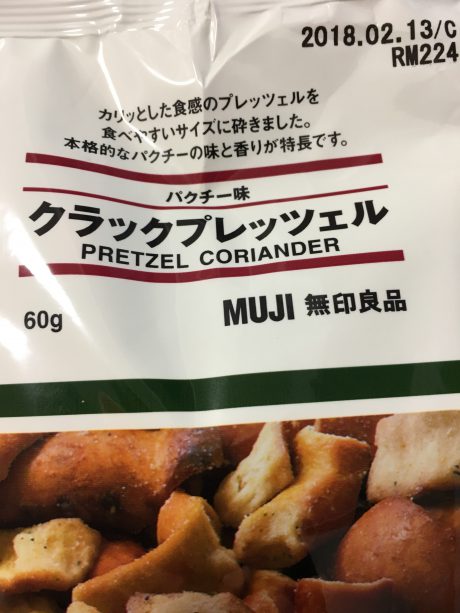
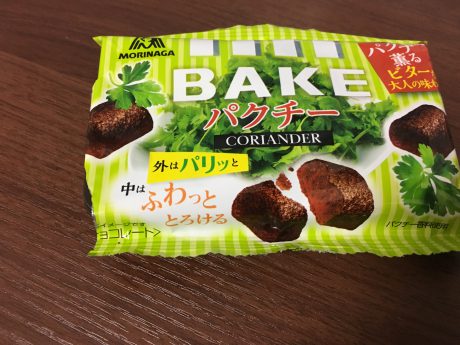
Tuesday, November 7th “Coming up with journal topics”
I have a student who is really good at coming up with journal topics. In a journal, it’s important to express what you experience in your daily life. For example, what you see, what you feel, what you taste, and what you hear. When we encounter these situation, it’s important to write it down or take a picture of it so we won’t forget. The people who really improve their English are always thinking, “how do I say this in English?” That’s a really important thing in language learning, always trying to express as much as you can. I’ll share with you what one student does.
She takes a picture of what she sees and tries to translate what’s written.
Example 1.
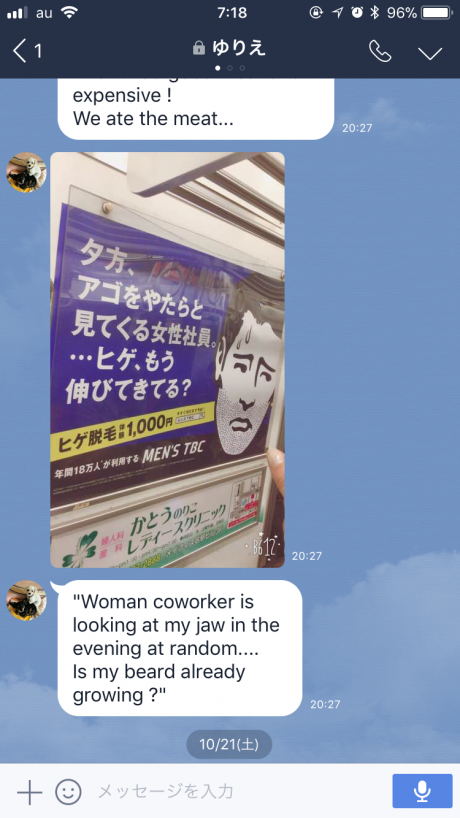
The Japanese says, 「夕方、アゴをやたらと見てくる女性社員、、ヒゲ、もう伸びてきてる?」
Translation: “Female coworkers are rather staring at my jaw in the afternoon. Has my beard already grown?”
It’s ok, if it’s wrong. What’s important is to always try to EXPRESS in English.
Here’s another one she tried to translate.
Example 2
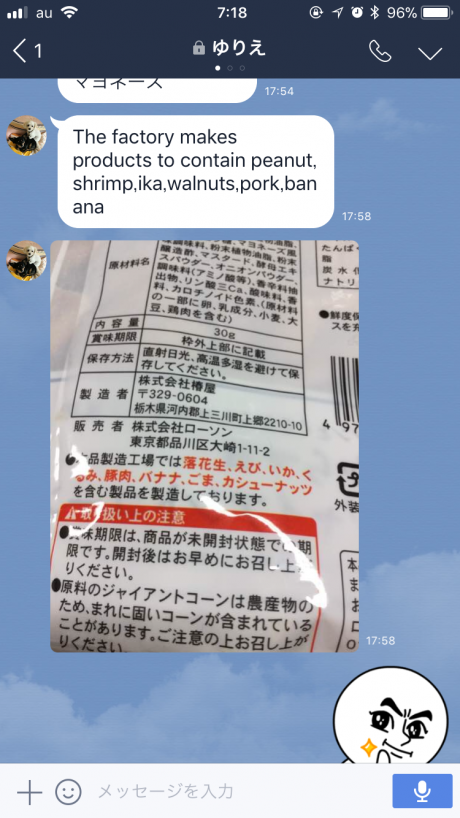
Here, she’s trying to translate the ingredients of a snack.
「工場では落花生、えび、いか、くるみ、豚肉、バナナ、ごま、カシューナッツを含む製品を製造しております。」
“The factory makes products that contain peanuts, shrimp, squid, walnuts, iron, banana, sesame, cashew nuts. “
Sometimes, it’s important to be able to say 「いか」or 「ごま」in English. 「いか」is squid and 「ごま」is sesame.
In the next example, she’s just expressing her feeling.
Example 3
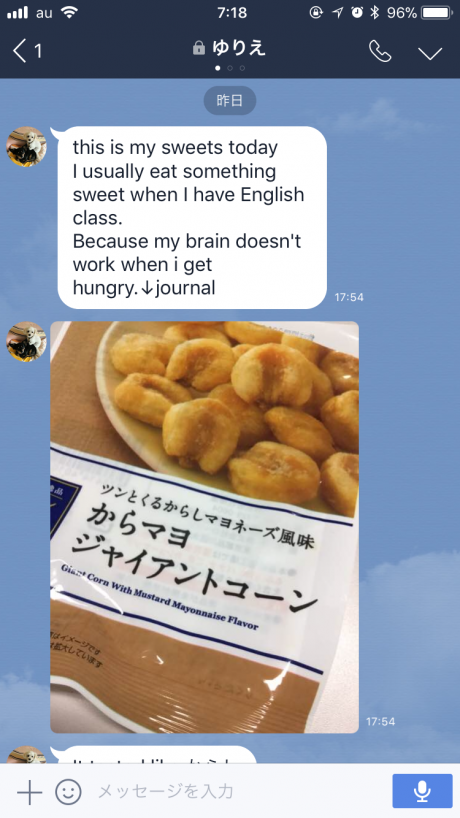
She wrote, “This is my sweets for today. I usually eat something sweet when I have an English class because my brain doesn’t work when I get hungry”
I think she’s doing a great job coming up with different things to write in her journal and it’s always fun to listen to her.
I think using your smartphone’s camera feature is a really good way to remember the journal moments in your daily life.
come up with 「思いつく」
I have a student who is really good at coming up with journal topics. (ジャーナルトピックを思いつくのがとても上手な生徒さんがいます。)
encounter 「出くわす」
When we encounter these situation, it’s important to write it down or take a picture of it so we won’t forget. (もしそのような状況に出くわしたら、それを忘れないように書き留めたり、写真を撮ることが大切です。)
express 「表現する」
Always try to express as much as you can. (できるだけ多く表現することを心がけよう。)
translates 「翻訳する」
She takes a picture of what she sees and tries to translate what’s written. (彼女は書いてある内容を写真を撮りそれを翻訳しようとする。)
Wednesday, November 9th “Kyoto Adventure”
I’ll be going to Kyoto to see my sister and her kids on November 18th. I think it’s a great chance for me to get to know Kyoto really well. I can’t really depend on my sister to guide me around Kyoto because she didn’t even know Kiyomizu temple. I was just talking to her on the phone and she said, “What’s Kiyomizu temple?”. I was surprised how little she knows about Kyoto and Japan in general.
I asked one of my students who is a Kyoto expert. Actually, she’s a real Kyoto lady. She was born and raised in Kyoto. She has kindly given me a list of places to go. I would like to study that list and try to check out those places.
I realized that the best way to get around Kyoto is by bicycle. Fortunately, I’m really good at riding my bicycle so I decided to take my bicycle to Kyoto. I’m not going to ride there but I’m going to carry my bicycle on the train. It sounds like it’s a pain in the neck but I think that’s the best idea.
depend on 「頼る」
I can’t really depend on my sister. (妹には頼れない。)
get around 「移動する」
They best way to get around Kyoto is by bicycle. (京都を移動する一番いい方法は自転車だ。)
a pain in the neck 「面倒」
It sounds like it’s a pain in the neck. (面倒のように聞こえる。)
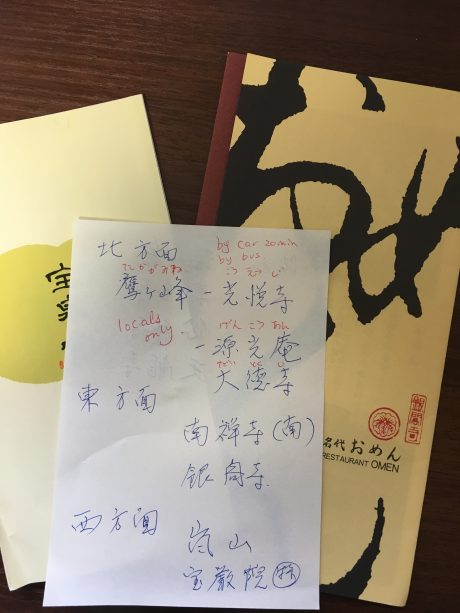
Sunday, November 12th
Today, I got the Shinkansen ticket for Kyoto. I got it online. It was really easy to reserve. I was afraid that I wouldn’t be able to get seats because it’s autumn leaves season. However, there were enough seats left.
I was planning on taking my own bicycle because my sister and I will be going sightseeing on our bikes. However, it would be a real pain in the neck to take apart my bicycle and put it back together. Therefore, I decided to look for a rental bicycle shop near Kyoto station. There were a few of them. I picked one that seemed easy to reserve.
When I was looking at their website, I found out that they had a bicycle tour service. I won’t be able to join the tour this time because I’ll be with my sister’s family but I thought I would like to join it next time.
Since I’ll be going to Kyoto a lot in the next 3 years, I think I’ll be able to become a Kyoto expert myself. At that time, I might make my own bicycle tour and guide tourists around. Who knows, maybe that’s my next job.
I was afraid 「心配だった」
I was afraid that I wouldn’t be able to get seats. (席を取れないのではないか心配だった。)
left 「残り」
However, there were enough seats left. (席は十分に残っていた。)
Who knows. 「誰にもわからないよ、ひょっとしたら」
Who knows, maybe that’s my next job. (ひょっとしたら、私の次の仕事かも。)






